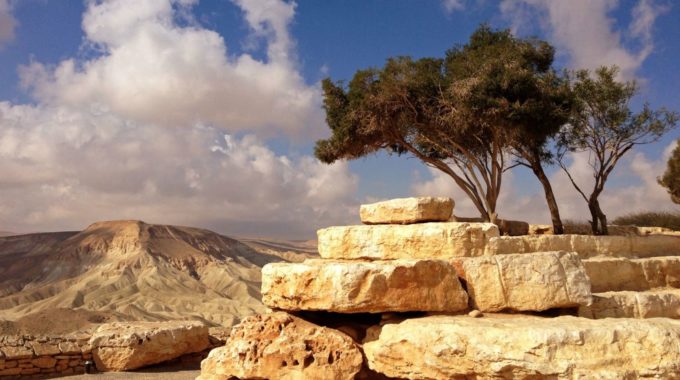Adapted from the writings of Dayan Yitzhak Grossman April 18, 2024 AP News reports: A…

Living off the Land: May One Reside outside Eretz Yisrael? Part II
Adapted from the writings of Dayan Yitzhak Grossman
August 11, 2022
Our previous article discussed some of the justifications offered by the poskim for Jews living in chutz la’aretz; this article continues that discussion.
The danger of the journey
The Gemara cites a breisa:
If the husband says that he wishes to ascend (move to Eretz Yisrael), and his wife says that she does not wish to ascend, she is forced to ascend.[1]
Tosafos comments that this does not apply in Tosafos’s time, because the roads are dangerous. R’ Shlomo ben Shimon Duran (the Rashbash) cites this position of Tosafos in three of his teshuvos. In one of these he declares that this is completely self-evident, because “there is nothing that stands in the way of danger.”[2] This might be thought to imply that in circumstances of danger there is no mitzvah to travel to Eretz Yisrael, and on the contrary, it is wrong to do so, but in another teshuvah he concludes that “each individual should evaluate for himself: If he wishes to endanger himself, let him ascend, and if not, let him refrain.”[3]
The Shulchan Aruch cites the position of Tosafos (as “some say”),[4] but it seems clear that modern air travel does not entail a level of danger that is halachically relevant.
The mitzvos of Eretz Yisrael
Tosafos further cites the position of Rabeinu Chaim that “in our time there is no mitzvah to live in Eretz Yisrael,” since we are unable to properly fulfill the many mitzvos that apply only in Eretz Yisrael.
R’ Yosef of Trani (the Maharit) is baffled by this argument:
One who wishes to purchase land in Eretz Yisrael can fulfill every positive commandment, such as leket, shich’chah, peiah, and the like, and he can likewise be careful of every negative commandment, and who will stop him?
Due to this and other counterarguments, the Maharit dismisses this comment of Tosafos as not authoritative.[5] The Shulchan Aruch does not cite the opinion of Rabeinu Chaim.[6]
Parnasah
R’ Yisrael Isserlin (the Trumas Hadeshen), in response to the question of whether there is a mitzvah to live in Eretz Yisrael today, explains that although living in Eretz Yisrael, and a fortiori Yerushalayim, is certainly a good and most praiseworthy thing, there are several practical reservations to consider, including the great difficulty of earning a living in Eretz Yisrael due to the very poor economic conditions there.[7] This point is elaborated upon by R’ Yonah Landsofer (the Me’il Tzedakah), who asserts that one should not move there without a concrete plan for ample parnasah, because poverty can lead a person away from Hashem. This is especially true when young children are involved, because their intellectual immaturity renders them unable to tolerate a life of penury and may result in their turning onto a bad path (yeitz’u letarbus ra’ah).
Kibud av va’eim
Although many poskim maintain that the mitzvah of living in Eretz Yisrael takes precedence over the mitzvah of kibud av va’eim, and one is consequently not obligated to obey the order of a parent to remain in chutz la’aretz,[8] some poskim say the reverse is true, that the mitzvah to honor and obey one’s parents takes precedence over the mitzvah to live in Eretz Yisrael.[9]
Mitzvah kiyumis
Some poskim maintain that while leaving Eretz Yisrael for chutz la’aretz is the subject of a full-fledged prohibition, living in Eretz Yisrael is merely an optional mitzvah (kiyumis), not a binding one (chiyuvis).[10]
[2]Shu”t Rashbash end of siman 1.
[3]Ibid. siman 3, and cf. siman 2.
[5]Shu”t Maharit (cheilek 2) Y.D. siman 28.
[6]Cf. Knessess Hagedolah ibid. Hagahos Bais Yosef os 25; Ba’er Heiteiv ibid. s.k. 19; Shu”t Igros Moshe cited in this article’s final footnote.
[7]Trumas Hadeshen psakim siman 88.
[8]Sha’arei Teshuvos LeMaharam ben Baruch, sha’ar 2 siman 79; Shu”t Mabit cheilek 1 siman 139; Yayin Hatov cheilek 2 Y.D. siman 7. Cf. Shu”t Bais Yehudah (Ayash) Y.D. siman 54.
[9]Panim Yafos beginning of Parshas Lech Lecha; cf. Shu”t Tashbatz cheilek 3 siman 288; Shu”t Tzitz Eliezer cheilek 14 siman 72.
[10]Shu”t Maharit Tzahalon siman 85 s.v. Vera’isi; Shu”t Igros Moshe E.H. cheilek 1 end of siman 102; cf. Tzitz Eliezer ibid. os 7.





